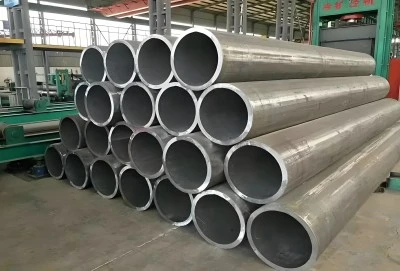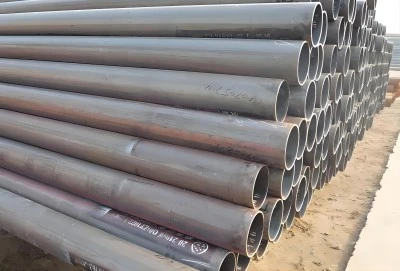EN 10210 is a European standard specifying technical delivery requirements for hot-finished hollow sections of structural steels. It is essential for engineers, manufacturers, and construction professionals dealing with S275 steel pipe and tubes. Covering both non-alloy and fine grain steels, EN 10210 outlines guidelines for chemical composition, mechanical properties, and dimensional tolerances. The standard is divided into two parts: EN 10210-1, which details technical delivery conditions, and EN 10210-2, which addresses tolerances, dimensions, and sectional properties, ensuring steel pipes meet quality and performance criteria.
|
|
|
Distinction between S235, S275 and S355 Steels:
The S235, S275, and S355 grades of structural steel, outlined in the EN 10210 standard, differ mainly in their yield strength. S235, with a minimum yield strength of 235 MPa, is suitable for general applications. S275, with 275 MPa, offers improved strength for more demanding structures. S355, at 355 MPa, provides the highest strength and is ideal for heavy-duty applications, ensuring superior load-bearing capacity and structural integrity in challenging environments.
- S235: This grade has a minimum yield strength of 235 MPa (megapascals) for nominal thicknesses up to 16mm.
- S275: With a minimum yield strength of 275 MPa for nominal thicknesses up to 16mm, S275 offers improved strength compared to S235.
- S355: The highest grade among the three, S355 has a minimum yield strength of 355 MPa for nominal thicknesses up to 16mm, providing the greatest strength and durability.
It's important to understand that while the S235, S275, and S355 grades of structural steel are defined by their minimum yield strength, the actual yield strength can vary based on material thickness. According to the EN 10210 standard, as the thickness of the steel increases, the minimum yield strength may slightly decrease to account for variations in material behavior and processing.
Beyond yield strength, these steel grades also differ in their chemical composition and other mechanical properties such as tensile strength and elongation. Higher-grade steels like S275 and S355 generally have more stringent requirements for chemical composition, which can influence properties like hardness and impact resistance. As the grade number increases, the steel typically becomes stronger and more resistant to deformation under load. However, this increased strength often comes with a trade-off in ductility, meaning that while the steel can withstand higher stresses, it may exhibit slightly reduced ability to stretch or deform without breaking. This balance is crucial for selecting the appropriate steel grade for specific structural applications.
How to Select Steel Pipes According to EN 10210 Specification:
Selecting the appropriate steel pipe grade according to the EN 10210 specification involves considering several factors: the specific load requirements, environmental conditions, expected stresses, and any applicable regulatory standards. These considerations ensure the chosen grade meets performance and safety criteria.
- Application requirements: Determine the specific needs of your project, including load-bearing capacity, environmental conditions, and any special requirements such as weldability or corrosion resistance.
- Strength requirements: Based on your structural calculations, choose the grade that provides adequate yield strength for your application. S355 offers the highest strength, followed by S275 and then S235.
- Cost considerations: Higher grade steels generally come at a higher cost. Evaluate whether the increased strength of S275 or S355 justifies the additional expense for your specific application.
- Availability: Check with suppliers to ensure the availability of the chosen grade in the required dimensions and quantities.
- Fabrication methods: Consider the ease of welding and forming for each grade. While all three grades are generally weldable, higher grades may require more careful welding procedures.
- Dimensional requirements: Refer to EN 10210-2 for specific dimensional tolerances and ensure that the chosen pipes meet your project's size and shape requirements.
- Surface finish and coating: Determine if any specific surface treatment or coating is needed for your application, and ensure compatibility with the chosen steel grade.
- Regulatory compliance: Verify that the selected grade meets any local building codes or industry-specific regulations applicable to your project.
By carefully considering factors such as load requirements, environmental conditions, and specific mechanical properties, and consulting with experienced engineers or suppliers, you can select the most appropriate steel pipe grade for your project. Ensuring that your choice aligns with the EN 10210 specification will help achieve optimal performance, safety, and durability in your structural applications.
S275 Steel Pipe For Sale:
S275 steel pipes are widely available in the market due to their balanced combination of strength and cost-effectiveness. These pipes are suitable for various structural applications in construction, infrastructure, and industrial projects. When looking to purchase S275 steel pipes, consider the following points:
- Reputable suppliers: Choose suppliers with a proven track record of providing high-quality steel products that comply with EN 10210 specifications.
- Certification: Ensure that the pipes come with proper certification, including material test certificates that verify compliance with EN 10210 standards.
- Dimensional range: S275 steel pipes are available in various sizes and shapes, including circular, square, and rectangular hollow sections. Confirm that your supplier can provide the specific dimensions required for your project.
- Delivery options: Consider factors such as lead times, shipping costs, and minimum order quantities when selecting a supplier.
- Additional services: Some suppliers may offer value-added services such as cutting, coating, or custom fabrication. Evaluate whether these services could benefit your project.
Conclusion:
LONGMA GROUP specializes in S275 steel pipes that adhere to EN 10210 specifications, ensuring they meet the highest standards for structural applications. Our pipes come with an array of certifications including API 5L, which guarantees their quality for pipeline use, and ISO 9001 and ISO 14001, which reflect our dedication to quality and environmental management. Additionally, our FPC and Environmental Quality System certificates affirm our commitment to excellence in manufacturing and sustainable practices. For further details or to inquire about our S275 steel pipes, please contact our sales team at info@longma-group.com.














